Mon 23 Dec 2013
Two Movie Reviews by Dan Stumpf: KONGO (1932) and WHITE WOMAN (1933).
Posted by Steve under Films: Drama/Romance , Reviews[4] Comments
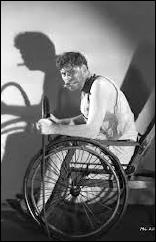
KONGO. MGM, 1932. Walter Huston, Lupe Velez, Conrad Nagel, Virginia Bruce, C. Henry Gordon. Director: William J. Cowen.
WHITE WOMAN. Paramount, 1933. Carole Lombard, Charles Laughton, Charles Bickford, Kent Taylor, Percy Kilbride. Director: Stuart Walker.
Caught a couple of of lush tropical melodrama-cum-horror flcks a few weeks back; both are based on stage plays and both quite fun.
Kongo is a sweaty, steamy, depraved-looking thing, with Walter Huston… well, I almost said he was in excellent form, but here he plays a paraplegic, confined to a wheelchair and determined to wreak baroque vengeance on the man who put him there (a role he played on Broadway before Lon Chaney took it up in the film west of Zanzibar).
To this end, he has set up a trading post in the African jungle, where he cows the natives with stage magic, helped along by Lupe Velez, who radiates her own steam, thank you very much.
Houston wriggles about the place like a grimy spider, moving his victims about like game-pieces, marking the days till he springs his trap on a calendar scrawled iver with the words “HE SNEERED!”
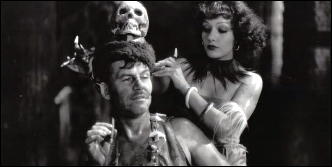
This could be corny stuff, all right, but everyone plays it to the edge without tripping over. Director William Cowen (who he?) keeps things moving right along and handles the crucial scene — a satisfying and improbable twist that reverses everything we thought was happening — without blinking at the old-fashioned melodrama, and Harold Rosson photographs with what looks like s sheen of sweat over it all.
Even normally uninspired actors like Conrad Nagel and Virginia Bruce put it across quite well. In all, a movie to set aside your critical faculties and simply enjoy.
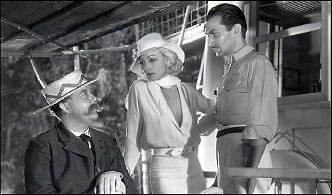
White Woman tiptoes through similar tropical tulips, and does it quite neatly, thanks mostly to a script by Frank Butler that keeps things edgy and unpredictable, pacey direction from Bluert (Werewolf of London) Walker, and the usual Paramount patina of soft-focus splendor.
There’s moody acting from Carole Lombard as the eponymous “entertainer” who winds up in a remote rubber plantation, Charles Bickford, Kent Taylor, and Charles Middleton, as lost souls slaving away in the heat, but the film belongs to Charles Laughton, who plays the jungle tyrant, and plays it for laughs — which makes a nasty part somehow more disturbing.
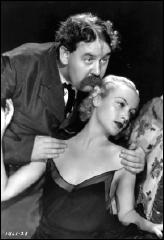
Made up with frizzy hair and a silly moustache, Laughton gads about in a stripes, plaids and polka-dots, inflicting one deliberately sick joke after another on his unwilling workers, oblivious to the mounting tension until he sets off a tribal uprising (in hilarious fashion) and tries to deal with the bloody outcome.
Where Kongo seems deliberately theatrical, Woman keeps undercutting the melodrama with surprising bits of business from characters who stubbornly refuse to play by the rules of the genre: Laughton in particular is constantly faced with dramatic outbursts, only to respond as if he wasn’t even in the same movie, kidding around with an unnerving humor about as funny as Richard Widmsrk’s laugh.
The result is that rarity, an old-fashioned tale that keeps one wondering what’s coming next.
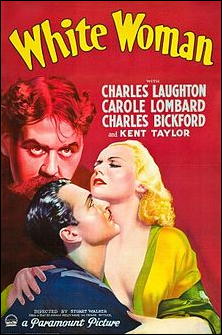
December 23rd, 2013 at 6:29 am
After years of casually waiting to see KONGO, and even finding WEST OF ZANZIBAR ahead of it, I was a bit disappointed at finding it somewhat less than compelling (despite Huston and Velez) when catching it on YouTube at that link. But they are good. Now I will see how long it takes me to go find WHITE WOMAN…the title alone might make distribution more problematic today…
December 23rd, 2013 at 10:15 am
I’ve seen both these movies and liked them alot. After seeing a film I rate it on the IMDB website and I gave both films 9 out of 10. Walter Huston and Charles Laughton are two of my top favorite actors.
December 23rd, 2013 at 9:11 pm
KONGO is interesting to compare to WEST OF ZANZIBAR, both in terms of Chaney/Huston’s performances, but the differences between silent and talkie film making. As over the top as KONGO is there is a barely perceptible line between the melodrama of the silent and talkie versions that reflects the mediums differing needs.
That said Chaney brings a certain naturalism to even the most theatrical roles, one of the keys to his success. Here Huston may even be a shade less restrained than Chaney, certainly he brings perversity to the character more inferred than obvious in the Chaney film.
In England they called these ‘barn burners’ (because barns burning down wasn’t an unknown phenomena when overly active theatrical performances were given in one), which I suspect fits both films.
Personally, I enjoy well done melodrama and both films are that. Of the two films reviewed, KONGO may be the less satisfying thanks to a rather dull supporting cast. WHITE WOMAN, on the other hand, never quite goes where you suspect — and frankly has a much better cast in general.
December 23rd, 2013 at 11:27 pm
Having seen neither, both are definitely “musts” now.